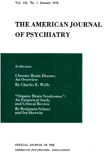VASCULAR CRISES ASSOCIATED WITH MONOAMINE-OXIDASE INHIBITORS
Abstract
The authors gave 1,223 courses of antidepressant medication, and in 692 courses MAO inhibitors were used.
Prior to Sept. 7, 1963, 8.4% of patients receiving MAO inhibitors experienced acute hypertensive crises featured by intense occipital headache and palpitation. After Sept. 7, 1963, patients receiving MAO inhibitors were advised not to eat cheese and the incidence of acute reactions fell to 3.3%. Of the 8 reactions in the latter series, 5 followed the ingestion of cheese, despite our warning, 2 followed the taking of cream in fairly large quantity and one occurred immediately after drinking 17 oz. of draught beer on an empty stomach after sunbathing.
The highest incidence of these reactions occurred with tranylcypromine, but nevertheless this drug is being used more frequently than any other MAO inhibitor and is regarded as indispensible in the treatment of depressive illness.
Acute vascular crises, when they occur, are immediately relieved with intravenous phentolamine, but where the associated cervical muscular spasm has caused impaction of apophyseal joints neck manipulation has been required. Methoxybenzamine hydrochloride also appears effective in treating these reactions.
It is suggested that when an MAO inhibitor is dispensed to a patient, a label be attached to the container advising him against taking cheese, cream or alcohol, and warning his physician against giving powerful narcotic drugs, or agents related to amphetamine.
Access content
To read the fulltext, please use one of the options below to sign in or purchase access.- Personal login
- Institutional Login
- Sign in via OpenAthens
- Register for access
-
Please login/register if you wish to pair your device and check access availability.
Not a subscriber?
PsychiatryOnline subscription options offer access to the DSM-5 library, books, journals, CME, and patient resources. This all-in-one virtual library provides psychiatrists and mental health professionals with key resources for diagnosis, treatment, research, and professional development.
Need more help? PsychiatryOnline Customer Service may be reached by emailing [email protected] or by calling 800-368-5777 (in the U.S.) or 703-907-7322 (outside the U.S.).



